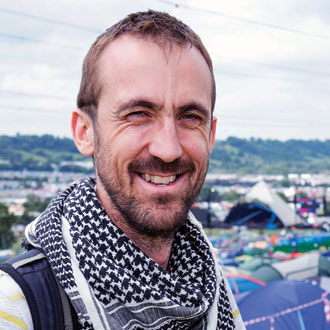
Profile
Dr Rowan Jones
Age 36
Role GP and volunteer doctor for Festival Medical Services, a charity made up of 1,500 volunteers
Location Practises in Weymouth, Dorset, and volunteers at festival across the UK, including Reading, Glastonbury and the Royal Bath and West Show
Hours Variable, but works 16 out of 120 hours on site at Glastonbury
15.00
I leave our camping area and walk across the festival site. I could take transport to my shift, but I want to soak up the buzzing atmosphere. It’s Thursday and the festival hasn’t started properly yet, but people are nevertheless flooding in, trying to bag the best camping locations. I’ve been to Glastonbury 10 times, and worked as a volunteer doctor for nine of those. I’ve volunteered at a number of festivals and country shows over the years, but this is my favourite.
15.45
Today I’m working at one of the smaller minor injury units that are located in marquee-sized tents around the site, instead of in the main ‘hospital’ tent. As a volunteer I work two eight-hour shifts in return for free entry to the festival, and I’m also allowed to bring my camper van into a secure medical camping area just offsite. This is a luxury as I’ll be onsite for six days and I’ve got my children (who are already festival veterans) in tow. I’m a GP partner, so I fit in my festival work – which usually amounts to a week every year – by doing it during annual leave.
16.00
I join the multidisciplinary handover in the unit, with colleagues from nursing, physiotherapy, podiatry and psychiatric nursing. They’ve had a quiet shift and no one is waiting, so we discuss any unusual patterns of drug use, injury or food poisoning. I’m glad to see I’m working with a few familiar faces from previous years. The doctor team is mostly made up of GPs and emergency doctors, although anaesthetists and intensive care specialists are here too. Depending on day and time, I may be the only doctor in the tent or I may be one of several.
19.00
Things are getting busier. So far I’ve seen the usual festival presentations – hay fever, lost inhalers, and requests for morning-after pills. Much of the work is like everyday general practice, although admittedly a large proportion of the patients are drunk. Still, they’re generally in a jolly mood and I’ve never experienced aggression here.
Being familiar with the common intoxicants – legal and otherwise – is an important part of the work. Teenagers who’ve taken so-called ‘herbal highs’ and present to us feeling a ‘bit weird’ are familiar. There’s also a need for basic minor surgical and first-aid skills.
It’s fantastic to have onsite access to radiology and consultant advice from the major specialties and dentistry. Patients are uniformly grateful, surprised by the medical services we have on offer.
22.00
Suddenly, six young men run into the tent carrying a friend. He appears to be deeply unconscious. His friends tell me he has taken ketamine after drinking beer all afternoon.
I’m stunned into inaction for a fraction of a second – this isn’t what I deal with in my day job. The team gathers around him, but he has a respiratory arrest within a minute of arriving. We do our ABCs and don’t forget the glucose, and after some brief bag valve mask ventilation he begins to come round. My colleagues get him ready for the ambulance, while I talk to the communications team and complete his paperwork. There are more than 200,000 people onsite, so communication, organisation and note-keeping are vital (notes stay with the Festival Medical Services team for quality assurance, investigation and planning).
Once the patient is in the hands of the paramedics, the team dives back into the work that’s built up in the meantime. There are cold people, scared people, constipated people and I treat a young woman who is having a miscarriage.
Examining her internally in a busy tent at night doesn’t seem appropriate. She is remarkably calm and collected and doesn’t have pain consistent with an ectopic pregnancy so I arrange for her to have an ultrasound scan onsite and to see a midwife the next morning.
00.00
My shift ends and I catch a Land Rover back to the campsite, along with the rest of my team. Everyone is chatting about what bands we want to see. I’m lucky to have a full two days off to enjoy the music before working again. Tomorrow, the festival begins for real.

















